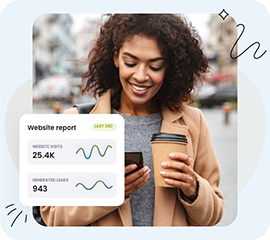Search engine optimization is a crucial part of creating a successful presence on the internet. SEO uses both on-page (within the pages of the site) and off-page (outside the site’s pages) to increase the traffic a site receives from the search engines.
An example of an on-page technique would be adding keywords to your pages, and an example of an off-page approach would be exchanging links with another website.
Here are some of the benefits of SEO:
- Search engine compatible XML sitemaps
XML sitemaps make it easier for search engine crawlers to see the depth of your website and keep track of things that have changed. By publishing your sitemap by default, we let search engines know what has changed without them having to crawl every page. - Page titles are H1 tags by default
As search engines crawl websites, they rate the importance of content based on the HTML tags they are under. As the H1 is the most crucial tag, your title becomes the most important piece of content on the page. - Alt tag options for all images
Search engines index images based on their alt tags. A website with images that have alt tags appears more content-rich and ranks higher. - Low load time
A website with low load times will rank higher than one with increased load times. - Images are optimized and have dimensions parameters
To improve the load time of your website, we optimize your images for the web by default. If you need your images to appear in their original format, you can turn optimization off. - Adding meta descriptions tags for each individual page
Adding meta descriptions that match the content of your website helps the SEO ranking of your website. - Nested navigation
Nested navigation allows you to silo content based on subcategories that will improve the breadth of keywords. Nested navigation also reduces the number of links on a page which improves SEO. - Adding hyphens between blank words in page names
Compared to underscores or percentage signs, hyphenated page names have a higher SEO ranking. - Ease of updating
Pages that are frequently updated rank higher in SEO than pages and sites that have not been updated in a long time. - HTML and indexable content (as opposed to Flash-based sites or Javascript-initialized content)
This means that search engines easily find all your content. - Name pages with keywords (as opposed to using internal page identifiers)
Search engines look at the page name when they rank a website on specific keywords. Matching the page’s name with quality keywords will help you rank higher.
If you need help with your HostPapa account, please open a support ticket from your dashboard.
